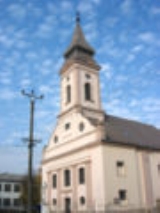
Sonta
Encyclopedia
Sonta is a village located in the Apatin
municipality, in the West Bačka District
of Serbia
. It is situated in the autonomous province of Vojvodina
. The village has a Croat
(from the group of Šokac) ethnic majority and its population numbering 4,992 people (2002 census).
and they came to this village under the leadership of Sonda Vidaković, thus the name of Sonta derived from the name of this person.
records, Sonta was mentioned as a settlement with 36 families, while in 1898, its population numbered 4,972 inhabitants and 650 houses. During 1920s, the village was moved 3 km to the north from its original location because of the large floods of the river Danube
.
On the session of the Municipality of Apatin in June 2006, Croatian language
gain the status of the official language in Sonta. Until then, Serbian language was the sole official language in this village , although Croats comprised majority in the village since the country of Serbia and Montenegro
was established.
Apatin
Apatin is a town and municipality in the Vojvodina administrative region of Serbia, located in the West Bačka District, at . The town of Apatin is the administrative, economic, cultural, educational and tourist centre of the municipality of Apatin...
municipality, in the West Bačka District
West Backa District
West Bačka District is a northern district of Serbia. It lies in the region of Bačka, in the autonomous province of Vojvodina. It has a population of 215,916...
of Serbia
Serbia
Serbia , officially the Republic of Serbia , is a landlocked country located at the crossroads of Central and Southeast Europe, covering the southern part of the Carpathian basin and the central part of the Balkans...
. It is situated in the autonomous province of Vojvodina
Vojvodina
Vojvodina, officially called Autonomous Province of Vojvodina is an autonomous province of Serbia. Its capital and largest city is Novi Sad...
. The village has a Croat
Croats
Croats are a South Slavic ethnic group mostly living in Croatia, Bosnia and Herzegovina and nearby countries. There are around 4 million Croats living inside Croatia and up to 4.5 million throughout the rest of the world. Responding to political, social and economic pressure, many Croats have...
(from the group of Šokac) ethnic majority and its population numbering 4,992 people (2002 census).
Name
According to some sources, inhabitants of Sonta originating from HerzegovinaHerzegovina
Herzegovina is the southern region of Bosnia and Herzegovina. While there is no official border distinguishing it from the Bosnian region, it is generally accepted that the borders of the region are Croatia to the west, Montenegro to the south, the canton boundaries of the Herzegovina-Neretva...
and they came to this village under the leadership of Sonda Vidaković, thus the name of Sonta derived from the name of this person.
History
It was first mentioned in the 12th century under name Zund. In OttomanOttoman Empire
The Ottoman EmpireIt was usually referred to as the "Ottoman Empire", the "Turkish Empire", the "Ottoman Caliphate" or more commonly "Turkey" by its contemporaries...
records, Sonta was mentioned as a settlement with 36 families, while in 1898, its population numbered 4,972 inhabitants and 650 houses. During 1920s, the village was moved 3 km to the north from its original location because of the large floods of the river Danube
Danube
The Danube is a river in the Central Europe and the Europe's second longest river after the Volga. It is classified as an international waterway....
.
On the session of the Municipality of Apatin in June 2006, Croatian language
Croatian language
Croatian is the collective name for the standard language and dialects spoken by Croats, principally in Croatia, Bosnia and Herzegovina, the Serbian province of Vojvodina and other neighbouring countries...
gain the status of the official language in Sonta. Until then, Serbian language was the sole official language in this village , although Croats comprised majority in the village since the country of Serbia and Montenegro
Serbia and Montenegro
Serbia and Montenegro was a country in southeastern Europe, formed from two former republics of the Socialist Federal Republic of Yugoslavia : Serbia and Montenegro. Following the breakup of Yugoslavia, it was established in 1992 as a federation called the Federal Republic of Yugoslavia...
was established.
Ethnic groups (2002 census)
- CroatsCroatsCroats are a South Slavic ethnic group mostly living in Croatia, Bosnia and Herzegovina and nearby countries. There are around 4 million Croats living inside Croatia and up to 4.5 million throughout the rest of the world. Responding to political, social and economic pressure, many Croats have...
= 2,966 (59.42%) - SerbsSerbsThe Serbs are a South Slavic ethnic group of the Balkans and southern Central Europe. Serbs are located mainly in Serbia, Montenegro and Bosnia and Herzegovina, and form a sizable minority in Croatia, the Republic of Macedonia and Slovenia. Likewise, Serbs are an officially recognized minority in...
= 975 (19.53%) - Hungarians = 267 (5.35%)
- RomaniansRomaniansThe Romanians are an ethnic group native to Romania, who speak Romanian; they are the majority inhabitants of Romania....
= 211 (4.23%) - Roma = 138 (2.76%)
- others.

